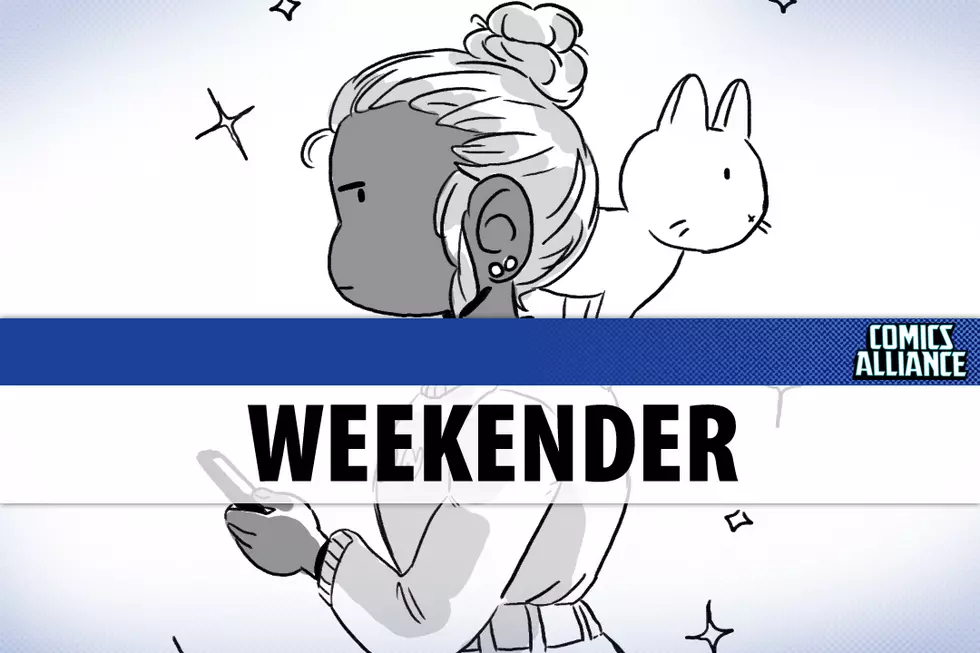
U.S. Citizen Charged in Canada for Manga on Laptop, Faces Minimum 1 Year in Prison
 After the recent seizure of comics at the Canadian border from creators on their way to the Toronto Comics Art Festival -- and an official advisory from the Comic Book Legal Defense Fund on the aggressive searches of comics fans at Canadian customs -- ComicsAlliance posted a series of tips on how to protect yourself when crossing the border into Canada with either printed comics or digital versions of comics on laptops and other devices. Given the escalating and broad nature of the Canadian border searches, it seemed like only a matter of time before someone was arrested for the crime of owning comics deemed "obscene" -- and now it has happened.
After the recent seizure of comics at the Canadian border from creators on their way to the Toronto Comics Art Festival -- and an official advisory from the Comic Book Legal Defense Fund on the aggressive searches of comics fans at Canadian customs -- ComicsAlliance posted a series of tips on how to protect yourself when crossing the border into Canada with either printed comics or digital versions of comics on laptops and other devices. Given the escalating and broad nature of the Canadian border searches, it seemed like only a matter of time before someone was arrested for the crime of owning comics deemed "obscene" -- and now it has happened.
A U.S. citizen, identified as a computer programmer and comic book fan, recently flew from his home in America to visit a friend in Canada, and upon his arrival, his iPhone, iPad and laptop were searched by Canadian customs who discovered digital manga images on the laptop. Presumably based on Canadian statutes that treat any sexual images of characters that appear to be under 18 as actual child pornography, the images they discovered were deemed child porn and the man was charged accordingly.
If convicted, the U.S. man, whose name is being withheld, faces a minimum of one year in prison for owning comic book illustrations, in a case that Comic Book Legal Defense Fund Executive Director Charles Brownstein says "could have far reaching implications for comic books and manga in North America."There are several things important to remember, the first being the dangerously broad definition of child pornography that Canada is using, as Brownstein explains:
Customs agents frequently use overly broad and inaccurate definition of "child pornography" in order to justify intrusive searches of materials that are fully protected by the United States Constitution. Under U.S. law "child pornography" is the record and product of child sexual abuse... The depiction of such child abuse in the form of "child pornography" can only involve real children – cartoons of fictionalized characters cannot be subjected to "child abuse." In such cases, the [Supreme] Court noted [in a 2002 case], "there is no underlying crime at all."
Illustrations are not photographs or video of children being sexually abused, and treating them as the same thing not only potentially criminalizes art -- an illustrated version of Romeo and Juliet, for example, could likely earn itself a "child pornography" label under this definition -- it also diminishes the crime of actual child pornography and the real abuse that it documents.
 Second, when you extend the definition of child pornography from sexual images of children (who are real people, and have ages) to drawings (which are not real, and do not have ages), suddenly that definition becomes very subjective. How exactly can you tell if a drawing is sixteen years old, or seventeen, or eighteen? Suddenly the determination about whether or not someone is in possession of child pornography -- a deeply horrific and often ruining accusation to make -- changes from clear cut to frighteningly ambiguous.
Second, when you extend the definition of child pornography from sexual images of children (who are real people, and have ages) to drawings (which are not real, and do not have ages), suddenly that definition becomes very subjective. How exactly can you tell if a drawing is sixteen years old, or seventeen, or eighteen? Suddenly the determination about whether or not someone is in possession of child pornography -- a deeply horrific and often ruining accusation to make -- changes from clear cut to frighteningly ambiguous.
The issue becomes even more complicated when dealing with manga, as this case specifically does, since Japanese comics have a very different visual aesthetic that frequently depicts adult characters in a way that would seem more "child-like" to a pair of American (or Canadian) eyes unfamiliar with the style.
The Comic Book Legal Defense Fund, a non-profit U.S. group devoted to protecting free speech in comics, has agreed to assist in the case, and has formed a coalition with the Canadian Comic Legends Legal Defense Fund to donate both funds and legal expertise. Brownstein emphasized the potential impact of this case on comic book fans all over North America:
Although the CBLDF can't protect comic fans everywhere in every situation, we want to join this effort to protect an American comic fan being prosecuted literally as he stood on the border of our country for behavior the First Amendment protects here, and its analogues in Canadian law should protect there.
The cost for the man's defense is currently estimated at $150,000, and if you would like to make a tax-deductible contribution to the CBLDF to support their work for free speech in comics and their assistance in this case, you can find more information here.
More From ComicsAlliance









